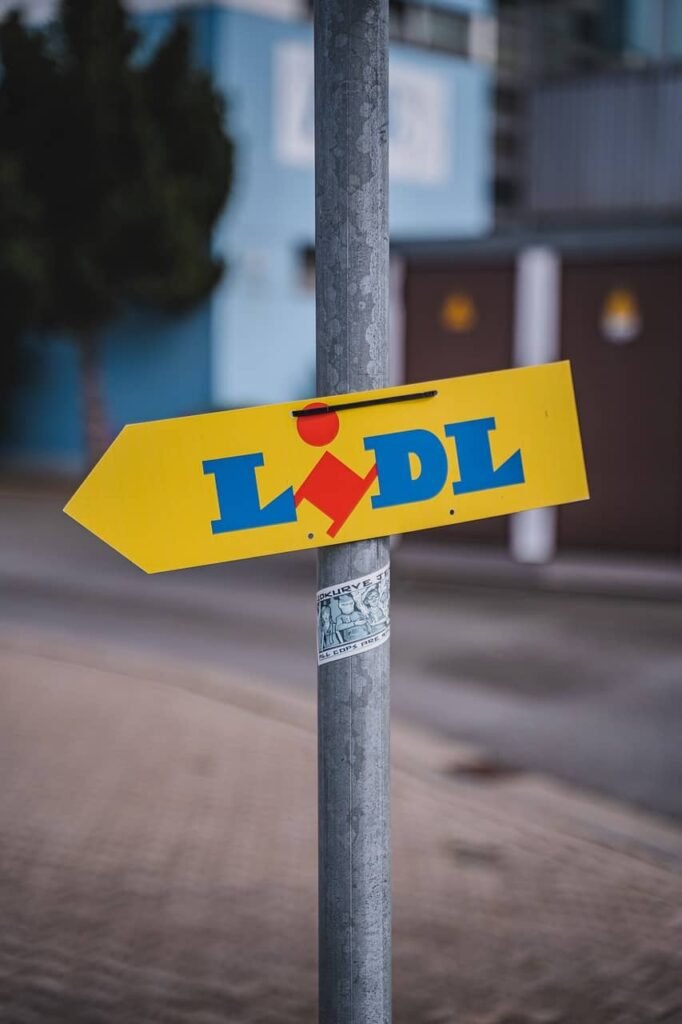Shopping.
Easy for neurotypicals but a struggle for an autistic person.
Yet some retail chains make shopping easier for neurodivergent people than others.
These are the 5 reasons shopping in Lidl feels more inclusive as a neurodivergent person compared to other grocery stores.
1. The lights aren’t as harsh as in other grocery stores
Harsh fluorescent lights are one of the factors that make grocery stores inaccessible for autistic people and other individuals with light sensitivity.
Some grocery stores have such bright lights that it’s torture to visit them, even with sunglasses. Lidl has fluorescent lights like any other store. They’re just not as bright as in some other supermarkets. I still need sunglasses when I visit Lidl, but at least I can enter the shop in the first place.
Well, sometimes, I can. I rarely visit even Lidl these days because it takes so much energy.
2. It’s smaller than other grocery stores
This advantage may not apply to all Lidl stores because some of them are the size of large hypermarkets. But the one I visit is smaller than most grocery stores.
That makes it less overwhelming for my neurodivergent brain. First of all, there are fewer people, which means less noise. That is not to say I don’t still wear earplugs — of course, I do! But the noise level of large hypermarkets is unbearable even with earplugs.
Even the little Lidl store I visit becomes a sensory hell when there is a screaming child or noisy school kids. I always pray they don’t end up in the store when I’m there.
It’s easier to find what I need in a small store. Even if I’ve visited a supermarket multiple times, it’s exhausting trying to find everything on my list. You also have to walk long distances in a large store, which leads to spending longer in it. And the longer you spend there, the more it drains you.
Of course, the selection in a small store is smaller than in a hypermarket. But that also means you don’t have as many choices, so you don’t get too overwhelmed.
Lidl is also much cheaper than other grocery stores in Finland. Of course, that’s one of the best parts of this chain. Usually, you have to visit the exhausting hypermarkets to get the best prices, while small grocery stores are more expensive. That’s not the case with Lidl.

3. You don’t need to weigh the fruit and vegetables
In Lidl, you can just put fruit and vegetables in your shopping basket, and the cashier weighs them for you at checkout.
Other grocery store chains in Finland make you weigh your fruit and vegetables. First, you need to find a scale. Then, you need to pick up the correct number to get a tag. That takes a lot of focus in the middle of a sensory hell.
Thanks to my ADHD brain, there’s a possibility that I forget to weigh my vegetables. Then, I go to checkout, and the cashier points out there’s no price tag. Or I just pressed the wrong button, and my bag of carrots has the price tag of bananas. And I have to go back to the other side of the massive store to weigh the bag of carrots while angry people in the cashier line give me murderous looks.
Having to weigh my vegetables is an extra step I don’t need as a neurodivergent person who struggles to visit a grocery store. Lidl has removed that extra step. That reduces the strain of my grocery shop visit.
4. There are new and unexpected products
This factor about Lidl pleases my ADHD brain. A “pure” autistic may not enjoy new and surprising products at all.
But my ADHD side likes that Lidl always has some unexpected quirky and “exotic” products (usually foods) from different countries. Other grocery stores always have the same boring stuff sold in every other grocery store in Finland.
I consider myself a minimalist, so I’m not someone who finds shopping “entertaining”. I admit that new and “exciting” products involve the danger of buying something you don’t need.
But you need to buy food no matter what, so getting a little dopamine boost while grocery shopping can’t do much harm. Especially not for someone who finds grocery shopping a generally exhausting task.

5. The atmosphere feels more inclusive
I feel like I belong to Lidl more than other grocery stores. I don’t know why. That is not to say I still don’t feel like an autistic person in a neurotypical space that isn’t for someone like me. I do.
But in some places, including grocery stores, I feel so out of place it’s painful. You don’t feel like going to a supermarket when it gives you overwhelming anxiety and sadness because the pain of being an outsider is so real.
I get that feeling in the large Finnish supermarket chains (Lidl is German). There are all those masses of middle-class neurotypical people. That is not to say middle-class neurotypical people don’t visit Lidl, so I don’t know what it is about it that makes me feel less out of place.
Some places just have more inclusive energy.
What creates that energy?
I have no idea. If you do, please let me know!
Lidl still has room for improvement to make it neurodivergent-friendly
The neurodivergent-friendly factors of Lidl are most likely coincidences. I doubt that they have any strategy for making their stores autistic-friendly. I don’t think any retailer in Finland has taken conscious steps to improve accessibility for neurodivergent customers.
I’m still happy there’s at least one grocery store that is bearable for me to visit, even if it’s by coincidence.
There are still many things Lidl could improve:
- The freezers make a horrible, loud humming noise (could someone please design quiet freezers?)
- The fluorescent lights are still bright and awful (just less horrible compared to other stores)
- The automatically moving conveyor belt is annoying and overwhelming
- There’s nothing to absorb noise (too many hard surfaces, no soundproofing)
- People in general (including other customers) don’t consider others; they’re loud and talk on the phone in public spaces
Usually, I’m too overwhelmed to visit even Lidl. When that’s the case, I use the grocery pickup service of a supermarket. There’s an extra fee for that, and Lidl is cheaper anyway, so my wallet thanks me when I can handle a Lidl visit. Which is not often these days.
By the way, Lidl does not sponsor this post. I’m just sharing what I like about Lidl as an example of what makes a grocery store neurodivergent-friendly or at least somewhat tolerable as a neurodivergent person.
Because when I say I like shopping in Lidl, I mean I can sometimes tolerate it. I may even get excited about it for brief passing moments.
I cherish those passing moments of normalcy.
You might also like:







